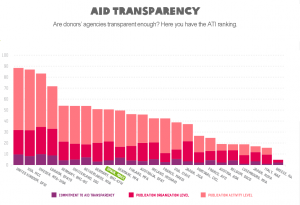The reality of aid in Spain – Using data for greater aid transparency and accountability
This is a guest post by Saya Saulière and Leonardo Pérez from Oxfam Intermón.
Last January Oxfam Intermon, the Spanish affiliate of Oxfam, launched a new website on aid transparency and monitoring (www.realidadayuda.org/en). We are pleased to announce that most of the contents of the website are now available in English. For the last 20 years, Oxfam Intermon has published a yearly report “Realidad de la Ayuda” that analyses comprehensively and critically Official Development Assistance (ODA) and development cooperation policy in Spain. This influential publication has allowed, over the years, policy changes towards better aid.
In 2015 we felt the need to jump into the digital age to be more interactive, more visual, to reach a wider audience and to respond faster. Moreover, being digital will allow us to collectively watchdog/oversee Spain’s development policy and work with citizens and civil society groups to push for more and better Spanish aid.
This platform aims to contribute to:
- Making Spanish ODA data transparent and accessible – We have intended to make a didactic and dynamic website. To achieve this, it was essential to display ODA in a visual way, to guide our visitors on how to interpret the data: comparing Spain’s achievements in implementing its commitments, against the performance of other countries or in terms of achieving objectives, benchmarks, etc.
- Monitoring and evaluating quantity, quality and effectiveness of Spanish ODA – Each visualization includes an evaluation that allows aid quality to be monitored. Moreover a series of concrete recommendations are made to the authorities on how to improve Spanish ODA and the implementation of these recommendations is then followed-up (see Demand Better Aid).
- Keeping track of political commitments – The development commitments made by Spain both internationally or in Parliament are captured and monitored regularly in order to put pressure on politicians to be accountable for their promises and to ensure that these commitments don’t sink into oblivion.
- Promoting a 2.0 watchdog in an electoral year – A module has just been launched to allow the close monitoring of regional electoral development pledges in party manifestos. It will offer an exhaustive analysis and enable the use of social media to put pressure on politicians for inclusion of the development agenda. In the autumn, we will continue monitoring these pledges during the general elections.
Our analysis of the use of the platform shows that Spanish citizens are engaging on this issue and do want to know how Spanish ODA is being spent. We certainly see the value in more detailed and timely data on Spanish development cooperation, showing individual projects and conditions, results and impacts of development cooperation, which would enable more effective monitoring.

While Spain does publish information on its aid to the international open data standard (IATI) – which would enable this to happen – the quality of this information is not good enough yet for this to be useful.
Looking to the future, we recommend that the government improves the quality of its IATI publication in order to meet its international commitment to publish to the Standard by the end of 2015 and incorporates IATI data in its info@OD portal, currently limited to the publication of statistical information for the period 2010-2013.
RealidadAyuda.org/en is designed as an open-source platform and it can be replicated in other countries willing to combine aid transparency, monitoring and watchdog 2.0. We welcome comments and feedback – please contact Saya Sauliere (ssauliere@oxfamintermon.org) and Leonardo Perez (lperez-aranda@oxfamintermon.org) for more details.

